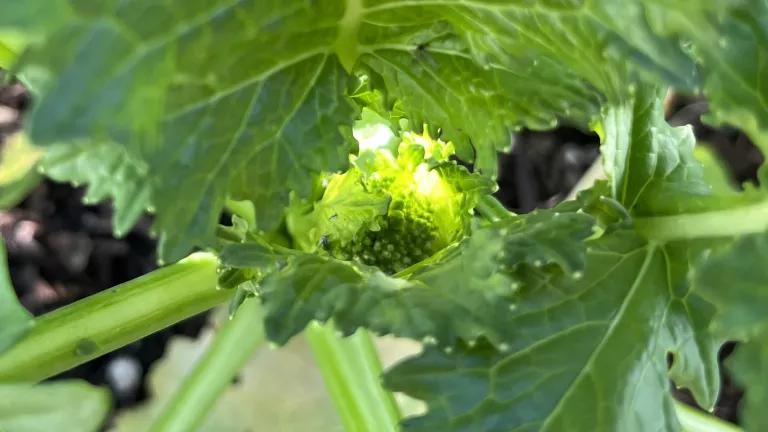We Need Healthy Farm Ecosystems – Not Harmful Pesticides
EPA should do more to protect pollinators – and we need to ramp up resources to help farmers build healthy ecosystems themselves.

A bee gathers pollen from a sunflower in Oakland, California
Allison Johnson
This week, the Ninth Circuit Court of Appeals struck down the Environmental Protection Agency’s (EPA) approval of a medically important antibiotic – streptomycin – for widespread use in citrus groves, because the agency failed to adequately analyze impacts on pollinators and ensure that the drug actually prevents the diseases claimed on its labels. The decision will protect workers, public health, and the environment by halting new uses of streptomycin on citrus farms (at least for now) – and it provides a window of opportunity to expand resources that help farmers transition to healthier options.
EPA’s expanded registration of streptomycin, which is used to treat common illnesses like urinary tract infections and tuberculosis, was one of many examples of EPA’s inadequate oversight of potential harms from chemicals used in our environment. The approval opened the door to the largest-ever use of a medically important antibiotic in plant agriculture, including on 650,000 acres of citrus in California and Florida. And, as in countless other instances, the agency failed to grapple with the compounding impacts on wildlife, workplaces, and farming communities from heavy reliance on chemicals in agriculture.
Citrus greening, a disease spread by the citrus psyllid, an invasive bug, has decimated the citrus industry in Florida and remains a serious threat in California and other citrus regions. Farmers are understandably desperate to find an effective solution that will save their farms and their livelihoods. However, blasting a medically important drug into the environment is not the type of long-term solution farmers and society need.
Instead of searching for a silver bullet for this intractable problem, it’s time to double down on technical and financial investments in approaches that we already know help farms thrive: building healthy soil and diversified farming. Crops grown in healthy soil tend to be stronger and better able to resist pest pressure. And farms that incorporate a variety of crops make it harder for pests and disease to easily jump from one target plant to the next. Promising research indicates that an ecosystems-based organic approach to pest management may be the best path forward for controlling citrus greening (and other pests) while also offering a wide range of health, climate, and economic benefits.
And yet, as a country, we’re not investing nearly enough in tools that will help farmers adopt these solutions. For example, the 2018 Farm Bill – the most significant piece of food and agriculture legislation in the country – directed only 0.1% of its $428 billion budget to organic-specific programs over five years. Farm Bill conservation programs that pay farmers to adopt practices that protect the environment are also chronically oversubscribed. The next Farm Bill, which Congress is currently drafting, should dramatically scale up the resources available to help farmers navigate pest challenges, without chemicals that threaten human, animal, and environmental health.

The 2018 Farm Bill directed just 0.1% of its $428 billion price tag to organic agriculture. Sources: Agriculture Improvement Act of 2018 (Public Law 115–334, Dec. 20, 2018); USDA Economic Research Service Based on Congressional Budget Office, Direct Spending Effects for the Agriculture Improvement Act of 2018 (2018 Farm Bill), December 11, 2018; USDA Budget Explanatory Notes, NIFA & AMS, 2021-2024.
Dana Delos Santos & Abby Talboy
The Opportunities in Organic Act is one key piece in the transition from chemical-dependent agriculture to the resilient farming systems we need, especially in a changing climate. Building on the U.S. Department of Agriculture’s (USDA) Organic Transition Initiative, the Opportunities in Organic Act would provide flexible, holistic support for farmers interested in farming organically – whether they need technical assistance with natural pest management or a new business plan for the farm.
Investments in organic farming are increasingly essential, because the flaws in EPA’s approval of streptomycin are not unique. For example, EPA conceded that “in the thousands of pesticide registrations it has approved in the past decades…, it has met its [Endangered Species Act] obligations for less than 5% of those actions.” We cannot continue to rely on poorly regulated chemicals to prop up our food supply. EPA must do better in meeting its own obligations. We also urgently need Congress to adopt food and farming policies that align with our health and environmental needs – in the next Farm Bill and beyond.




